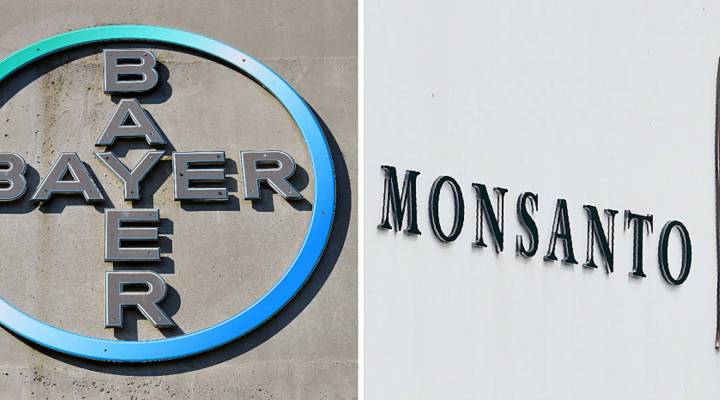
The latest bumper crop in agriculture: mergers

Bayer AG and Monsanto are the latest agribusiness giants hoping that a merger will help them better weather a downturn in the agricultural economy.
Monsanto is the world’s largest supplier of genetically modified seeds and the maker of the weed killer Round-up. Bayer is better known for its pharmaceuticals. But it’s also a player in seeds and chemicals.
The German company is buying Monsanto in a deal worth about $66 billion, including debt.
Commodities prices have been in a slump for a few years now, which has put pressure on the firms that supply farmers with seeds, herbicides and everything in between. A wave of consolidations has ensued. Syngenta, Dow and DuPont have put together their own recent deals.
Farmers are not exactly thrilled.
“They’re all seeing the farm economy is not going to be great for the next how many years,” said Casey Staloch, a seed dealer and farmer in southern Minnesota. “They’re looking out for the shareholders only.”
Staloch and other farmers fear the mergers will mean producers have fewer options when shopping for products like seeds or pesticides and will have to accept higher prices.
“If you have a merger where there’s less competition, you have pretty much an irresistible force hitting an immovable object,” said Bill Hejl, a crop producer in North Dakota. “Farmers can’t pay more, but then, they don’t have any competition getting them to drive down prices.”
That would make a bad situation worse, according to Staloch, who says prices have remained stubbornly high.
“For what it costs to grow a bag of seed and what they’re selling it for, everyone is getting fat and happy, and then, at the farm level, we’re just supposed to eat it and take a loss,” Staloch said.
Agriculture economist Scott Irwin at the University of Illinois said that without a recovery in commodities prices, crop producers will have to lower input costs at least $100 an acre to restore profitability. But it’s unclear where that savings will come from.
“In this lower price environment, there’s a giant game of chicken going on in the crop sector, on the input side,” he said. “Who’s going to blink first? Landowners, machinery manufacturers, fertilizer manufactures or seed manufacturers?”
Some farmers, including Staloch, have stopped using genetically modified seeds. They want to save on costs, and note that weeds are increasingly resistant to Round-Up, one of the herbicides used in conjunction with biotech seeds.
The more farmers ditch those biotech seeds, the tougher it is for the likes of Monsanto to turn a profit.
Bayer and Monsanto say that combining will help cut their costs and boost annual profits by about $1.5 billion after three years, with more benefits over time.
Barbara Patterson, government relations director with the National Farmers Union, said she’s worried cost-savings will mean fewer new products getting developed to serve farmers’ needs.
“The synergies talked about are often the layoffs of scientists or researchers,” she said.
But farmer Bill Hejl said it is possible the opposite could be true, providing a silver lining to the deal.
“Maybe they develop some new products that they would not have developed separately,” he said.
There’s a lot happening in the world. Through it all, Marketplace is here for you.
You rely on Marketplace to break down the world’s events and tell you how it affects you in a fact-based, approachable way. We rely on your financial support to keep making that possible.
Your donation today powers the independent journalism that you rely on. For just $5/month, you can help sustain Marketplace so we can keep reporting on the things that matter to you.


















